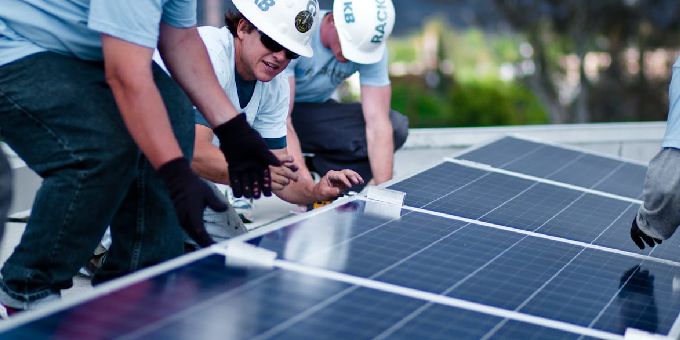The solar industry in the USA creates 260,000 jobs in the renewable energy sector annually, making it 17 times faster than other industries. With the USA leading the race for solar power, the rest of the countries are also following suit.
 Powering Towards a Sustainable Future
Powering Towards a Sustainable Future

Article from | KB Racking
The renewable energy industry is developing quite rapidly across the world. According to the International Renewable Energy Agency (IRENA), the generation capacity increase in 2020 was 260GW. The major contributor to this sort of massive capacity expansion is Solar PV energy. The total contribution of solar power itself is 127GW in 2020.
Aligning with the world trends, North America is also focusing on improving its infrastructure to invite more solar power generation. The statistics above show that the solar industry in the USA creates 260,000 jobs in the renewable energy sector annually, making it 17 times faster than other industries. With the USA leading the race for solar power, the rest of the countries are also following suit.
The US government introduced several federal policies to promote solar panel manufacturing as well as solar PV generation.
Manufacturing Tax Credit (MTC)
All manufacturers who are investing in new solar panel factories, expanding the currently available factory, or re-equipping it are eligible for a tax credit of30%. MTC is to promote more solar power equipment manufacturing within the United States.
Loan Guarantee Programs from Department of Energy
The government provided loan guarantees to companies who are interested in implementing solar manufacturing plants and solar power plants.
Investment Tax Credit (ITC)
ITC enables residential and commercial solar PV plant owners to recover their initial solar investment through a 30% tax credit.
Cash Grant
The cash grant program allowed the people interested in solar power to get a cash grant of 30% of the system cost disregarding the tax liabilities.
SunShot Solar Energy Initiative
This initiative is focused to increase domestic solar power up to 14% by 2030 within the USA. By 2050, they are looking to increase the share to 27%. These are the initiatives the USA is taking to promote solar power. Similarly, Canada and Mexico are on track to expand their solar energy footprint. Canada is aligning its policies to accommodate 20-50% of its total electricity generation by solar power.
To promote solar power, the Canadian government has introduced several types of systems such as:
· Net Metering
· MicroFIT
· FIT (Feed-In-Tariff)
· MicroGen
Through these programs, they expect to increase solar energy production. The Canadian solar program allows residents to generate solar power for their personal use first and then sell the excess energy that is generated into the grid.
While both the USA and Canada have massive land areas for potential solar generation, Canada has a lower solar capacity factor of 6% because of its geographical location, whereas the USA is approximately 15%, since it is closer to the equator.
The increases in efficiency and reduction in solar PV module prices makes solar energy a more feasible and profitable initiative for both individuals and businesses. Overall, we can clearly see that North America is on track towards a sustainable future.
The content & opinions in this article are the author’s and do not necessarily represent the views of AltEnergyMag
Comments (0)
This post does not have any comments. Be the first to leave a comment below.
